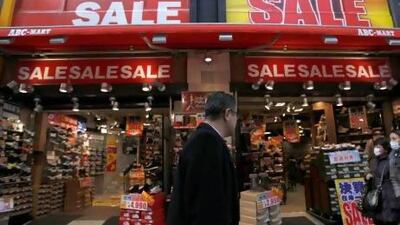The Japanese yen still has room to weaken further, and many see ¥95 to a US dollar as its desirable rate, said a key economic adviser to the Japanese prime minister Shinzo Abe, while dismissing growing charges that Tokyo was easing monetary policy to guide the currency lower.
Heizo Takenaka, who has advised Mr Abe on economic issues, and whose name has been floated as a possible candidate for the next head of the Bank of Japan (BoJ), said the yen's fall was a result of a correction from an excessive strength, and that the BoJ's latest easing measures were aimed at beating deflation, not a weaker yen.
"This correction has just started, it's not fair to say the yen has depreciated too much," Mr Takenaka told The Wall Street Journal on Saturday, referring to how the currency had been on a rise over the last several years. According to Mr Takenaka, in the past five or six years, the yen has gained as much as 40 per cent against the dollar and 50 per cent against the South Korean won. It has since depreciated 15 per cent against the dollar and 20 per cent against the won, he said.
"There's not a very scientific way of thinking about where the yen will end, but lots of people think a range around 95 to the dollar is appropriate at the moment," said Mr Takenaka, who spoke on the sidelines of a meting of political and business leaders in Davos, Switzerland. The dollar rose as high as ¥91.20 on Friday, a level not reached since June 2010. It ended New York trade at ¥90.93.
Mr Takenaka, who now sits on a government panel on industrial competitiveness, refuted increasing overseas criticism that Mr Abe's government had pushed the BoJ to adopt a 2 per cent inflation target in a bid to weaken the yen.
"The focus of policy is to stop deflation, not target the exchange rate," said Mr Takenaka. The move to inflation targeting brought Japan into line with practice in the United States, euro zone and many other countries, he said.
The BoJ's decision to set a 2 per cent inflation target and to move to an "open-ended" buying of assets from next year has drawn attention in Davos among policymakers, with some raising concerns that it may trigger a currency war or a competitive devaluation of currencies, while Japanese officials have been defending its actions.
"I don't want to say that I look towards Japan completely without concern at the moment," the German chancellor Angela Merkel told the meeting last week, adding: "In Germany, we believe that central banks are not there to clean up bad policy decisions and a lack of competitiveness."
On Saturday, speaking to participants through a satellite connection from Japan, Mr Abe assured the BoJ's independence remained "unshaken", adding that the central bank had the freedom to choose the measures to achieve its policy.
Mr Takenaka echoed the prime minister's words. "My view is first we should try purchasing Japanese government bonds from the market, I think that will have a positive impact. But if that is not enough to achieve the target, other things like purchasing foreign bonds could be considered."
The Keio University professor also said that if necessary, the new BoJ governor, to succeed the current governor Masaaki Shirakawa, whose term ends in April, could shift policy if necessary. "The government and central bank have already agreed the framework in the form of inflation targeting. If the new governor can't meet that target, then sooner or later they will move. So in that sense it doesn't matter so much who the governor is, because the framework has been agreed," he said.
Higher inflation was not a risk to Japan's ability to service its enormous stock of public debt, currently more than 200 per cent of GDP, said Mr. Takenaka. "If inflation rises, tax revenue will also rise, so it will make it easier to service the debt," he said.
"In the short term - one or two years - it's necessary to run an aggressive fiscal policy to get growth started, then it's necessary to run a restrictive fiscal policy to reduce the debt."
* Dow Jones

